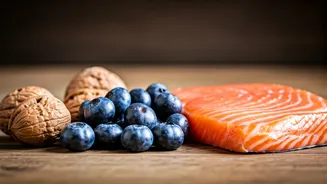Blueberries: The Memory Champion
Blueberries are renowned for their high antioxidant content, specifically anthocyanins. These compounds protect brain cells from oxidative stress, a primary
contributor to age-related cognitive decline. Regular consumption of blueberries has been linked to improved memory and faster learning abilities. They also enhance communication between brain cells, which is vital for information processing and recall. Including blueberries in your diet can be as simple as adding them to your morning cereal, yogurt, or enjoying them as a snack. They are versatile and delicious, making them an easy addition to a health-conscious lifestyle and a powerful ally in the fight against memory loss. The antioxidants in blueberries can cross the blood-brain barrier and help protect the brain from free radical damage.
Fatty Fish: Omega-3 Powerhouse
Fatty fish, such as salmon, tuna, and mackerel, are packed with omega-3 fatty acids, which are crucial for brain health. These essential fats are vital for building and maintaining brain cell membranes, improving the structure of neurons, and enhancing brain function. Omega-3s, specifically DHA (docosahexaenoic acid), support cognitive function and are directly linked to improved memory, learning, and overall brain performance. Studies have shown that a diet rich in omega-3s can even reduce the risk of cognitive decline associated with aging. Aim to incorporate fatty fish into your diet at least twice a week to reap these benefits. Consider grilling, baking, or pan-searing these delicious fish varieties for an added culinary experience. Ensuring you get adequate omega-3s is a proactive step toward maintaining a sharp mind.
Dark Chocolate: Antioxidant Treat
Dark chocolate, particularly with a high cocoa content, is rich in flavonoids, potent antioxidants that can improve blood flow to the brain. Enhanced blood flow is essential for optimal brain function, as it delivers vital nutrients and oxygen to brain cells. Flavonoids found in dark chocolate have also been associated with improved memory, focus, and overall cognitive abilities. Eating dark chocolate regularly can boost the production of endorphins, which further enhances mood and reduces stress, indirectly benefiting cognitive function. Remember to choose dark chocolate with at least 70% cocoa for maximum benefits. Enjoying a small square of dark chocolate is a simple and enjoyable way to protect your brain.
Nuts and Seeds: Brain Boosters
Nuts and seeds are excellent sources of vitamin E, an antioxidant that protects brain cells from damage. They are also rich in healthy fats, which support brain function and memory. Walnuts, specifically, are often praised for their high content of omega-3 fatty acids, which contribute to improved cognitive performance. Seeds like flaxseeds and chia seeds are also beneficial, offering essential nutrients that help maintain brain health. Eating a handful of mixed nuts and seeds daily provides a convenient and tasty way to support brain health. They are easy to incorporate into your diet; try adding them to salads, yogurt, or simply snacking on them between meals. This provides your brain with a continuous supply of vital nutrients.
Avocados: Healthy Fats Source
Avocados are packed with healthy monounsaturated fats, which support healthy blood flow and brain function. These fats help keep the brain's nerve cells in optimal condition, enhancing cognitive performance. Improved blood flow to the brain ensures it receives enough oxygen and nutrients, which is crucial for optimal cognitive function. Avocados also contain antioxidants that protect brain cells from damage. Adding avocados to your diet can be as easy as slicing them into salads, spreading them on toast, or including them in smoothies. This simple change can make a significant difference in brain health. Regular avocado consumption also contributes to improved memory and cognitive performance.
Whole Grains: Steady Energy
Whole grains, such as brown rice, oatmeal, and whole-wheat bread, provide the brain with a steady supply of glucose, which is the primary fuel source for the brain. The brain requires a constant stream of glucose to function at its best, and whole grains help to maintain stable blood sugar levels. This steady energy supply avoids the peaks and crashes that can impair cognitive function. Whole grains also contain vitamin E, an antioxidant that protects the brain. They are packed with fiber, which aids digestion and promotes overall health. Choosing whole grains over processed grains ensures the brain receives sustained energy, supporting alertness, focus, and memory. This is a crucial element for maintaining cognitive performance throughout the day.
Broccoli: Vitamin K Power
Broccoli is a nutritional powerhouse, rich in vitamin K and antioxidants, which are vital for brain health. Vitamin K is essential for cognitive function and plays a critical role in memory enhancement. The antioxidants in broccoli help protect the brain from damage. Regular consumption of broccoli has been linked to improved cognitive performance and a lower risk of cognitive decline. You can add broccoli to various meals, either steamed, roasted, or raw. Broccoli is versatile and can be easily included in your daily diet, providing essential nutrients for a healthy and sharp brain. It is also an excellent source of fiber and other vitamins and minerals, which also contribute to overall health.
Eggs: Choline and Protein
Eggs are a fantastic source of choline, a nutrient vital for brain health and memory. Choline plays a key role in the production of acetylcholine, a neurotransmitter essential for memory and learning. Eggs also offer high-quality protein, which helps keep the brain's structure in good condition. Incorporating eggs into your diet is simple and beneficial. You can eat them scrambled, boiled, poached, or as part of various dishes. The choline in eggs helps enhance memory and support overall cognitive function. They are a versatile food that can be easily incorporated into any diet, providing essential nutrients that support a sharp and efficient mind. Protein is essential for maintaining brain health.
Oranges: Vitamin C Boost
Oranges are excellent sources of vitamin C, a powerful antioxidant that protects brain cells from damage caused by free radicals. Vitamin C also helps improve cognitive function and mental clarity. Consuming oranges or other vitamin C-rich fruits can help enhance memory and protect the brain from age-related decline. Oranges are also a delicious and refreshing snack. They are easy to carry and enjoy anytime. Vitamin C is crucial for cognitive health and helps maintain a healthy brain. Adding oranges to your daily diet supports brain health and overall well-being. Regular consumption of oranges is essential for ensuring cognitive performance.
Spinach: Antioxidant Powerhouse
Spinach is packed with antioxidants and nutrients essential for brain health, including vitamin K, folate, and lutein. These compounds help protect brain cells from damage and improve cognitive function. Lutein, for example, is linked to better memory and overall brain performance. Folate contributes to the production of neurotransmitters that are essential for cognitive function. Spinach can be added to salads, smoothies, or cooked as a side dish. This ensures the brain receives vital nutrients that support cognitive health. The rich nutrients present in spinach can help improve memory, focus, and mental clarity, contributing to overall cognitive well-being. Including spinach is a great way to safeguard your brain.














